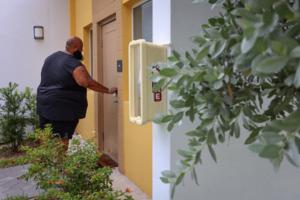Health
/ArcaMax

Jerry Zezima: Look who's walking
I’m the very model of the modern marching man. And I am determined to put one foot in front of the other until I walk headlong into a wall.
But I can’t say the same for the vast majority of walkers who don’t seem to know where they are going, usually while wandering aimlessly in front of me.
That is why I think people should be given ...Read more
They're here. They're queer. They're farming. New generation of LGBTQ farmers more visible and vocal
CHICAGO -- Laid off by a bar during the COVID pandemic, Jarvi Schneider turned to the internet for job leads.
The Chicago Botanic Garden was offering a training program for would-be farmers that included paid, hands-on experience, and Schneider signed up. That led to a business class and four years growing vegetables at a shared plot in ...Read more

Living without documentation or a home in one of California's hottest regions
LOS ANGELES -- Temperatures were fast approaching 116 degrees as Rubén Partida and his wife, Kimberly, loaded their dusty Nissan Frontier truck with two coolers of water and Gatorades blanketed in ice. As their neighbors prepared to shelter during the hottest part of the day on June 30, the Partidas began their outreach efforts to members of ...Read more

On Gardening: Sweetheart Shadowstorm is Sweet Caroline's newest sensation
One of the best things about being involved in plant trials is being proven wrong. People who are evaluating plants at the university level, garden writers and even industry pros are all guilty of judging a plant the day we take it out of the box or off the truck. A lot of those judgments are on aesthetics or beauty.
I’ll skip writing a ...Read more

Heidi Stevens: Susie Lee, co-founder of Early Birds dance parties, dies at age 49. ' The spirit and the soul of the whole thing'
There are moments in your life so powerful, so unexpected, so sensory and beautiful in their raw, unfiltered truth, that you know — even in the moment — you’ll never forget them.
I had one Feb. 8. I was standing inside the Park West theater on a frigid Chicago night with 1,000 other women. We were there to dance and sing and laugh and be ...Read more

Ask Anna: My boyfriend doesn't think I'm 'hot' -- how do I deal with that?
Dear Anna,
I’ve been dating my boyfriend for almost a year, and for the most part, things are great — we’re even talking about moving in together. But recently, during a conversation about past relationships, he admitted he doesn’t find me physically “beautiful.” He said he thinks I’m pretty and loves my personality, intelligence ...Read more

Heidi Stevens: Susie Lee, co-founder of Early Birds dance parties, dies at age 49. ' The spirit and the soul of the whole thing'
There are moments in your life so powerful, so unexpected, so sensory and beautiful in their raw, unfiltered truth, that you know — even in the moment — you’ll never forget them.
I had one Feb. 8. I was standing inside the Park West theater on a frigid Chicago night with 1,000 other women. We were there to dance and sing and laugh and be ...Read more

He's played Scrabble since he was 5. How he became a national champ
LEXINGTON, Ky. -- Mack Meller strolled into the Sedona Taphouse with a brown leather briefcase.
It had been a while since the 25-year-old joined the weekly gathering of the Lexington Scrabble club. Travel had taken up most of his time recently, but on a recent Sunday, Meller walked right into the restaurant, sat down, and began playing like he ...Read more

In a digital age, old-fashioned watchmaking schools, including a new one from Rolex, are in demand
Ever since watches began bringing order to the ephemeral passage of time, they also started doing something else: breaking.
Own one long enough and something will probably go wrong. It'll run slow. Or fast. Or stop altogether.
Decades ago, watch repair shops across the country were staffed with technicians who could service almost any ...Read more

Ask Dating Coach Erika: How do I not lose hope that I'll find the right person?
I understand how frustrating dating can feel sometimes, especially when you feel like you’ve been putting yourself out there over and over again. Feelings of frustration are valid.
My first question is this: Are you putting yourself out there in a productive way? Are you on two dating sites? (My recommendation is two, and if that feels ...Read more

As last baby boomers reach retirement, they tackle a quest for fulfillment
CHICAGO -- Forty-two stories above ground, Jon Gottlieb traced his bicycle route. From his vantage point by the pool, on his building’s roof, he could see the stop sign where he turns right, the road he hates crossing, the park he rides through and the tunnel that leads to the Lakefront Trail bike path.
Gottlieb, 75, rode this route at least ...Read more

LA hip-hop Jedi training camp mentors the producers of tomorrow
LOS ANGELES — On a recent Saturday in Inglewood, about a dozen acclaimed music producers including Dahi — who's worked with the likes of Kendrick Lamar, J. Cole and Drake — and DJ Khalil — who has collaborated with artists like Dr. Dre, Kanye West and Eminem — gathered with 80 students to geek out on the art of beat making.
The free ...Read more

Science is often inaccessible. This program is teaching scientists to communicate through art
PHILADELPHIA -- Christina Simms wouldn’t call herself an artist.
The Howard University student was a budding scientist visiting to do research at the Children’s Hospital of Philadelphia. Her main objective was to do lab work.
Yet as her summer internship entered its final weeks, she faced the daunting task of creating a piece of artwork ...Read more

The Magic Castle's training program for kid magicians is like a real-life Hogwarts
LOS ANGELES — Anja Steyn has three disparate loves: puzzles, horror movies and magic.
And during her show at the Magic Castle two weeks ago, she not only predicted the horror film someone was thinking of — she produced an almost-finished puzzle of the movie poster, with the last piece in the unsuspecting audience member's possession.
"Some...Read more

Ex-etiquette: Don't crash the party
Q. I must admit, the transition from being a couple to being single has been difficult to juggle. I’m not always angry and sometimes I think it might be cool to hang out with my ex. So, when he had the kids this weekend I showed up on Sunday and asked if they all wanted to go to breakfast. The kids were very excited and wanted to go, but their...Read more

Lori Borgman: Water tumblers salute Gulp of America
Hydration has officially become the cure for whatever ails us.
Feeling sluggish? Hydrate! Dry skin? Hydrate! Joints hurt? Hydrate! High blood pressure? Hydrate! Ingrown toenail? Hydrate! Don’t know what to make for dinner? Hydrate!
To join the wave of adequate hydration, one of our daughters thoughtfully gifted me with a pink XXL insulated ...Read more

The queens of pickleball
ATLANTA — A silver medal in Macon, a gold in Griffin — Atlanta resident Suzanne Ockleberry has a passion for pickleball. It’s not trophies she’s after though. She’s forging friendships one serve at a time.
The New Jersey native has turned her love for the game into a rapidly growing community, called the Atlanta Pickleball Queens, now...Read more

The Kid Whisperer: Parents should take away their kids' tablets and not give them back
Dear Kid Whisperer,
I’m struggling with my kids using their tablets so much. How much should I allow them to use them? I feel like they’re always on them, and that my wife and I don’t talk to our kids much anymore.
Answer: I was recently on a cruise ship that stopped at a private island. Thousands of my fellow cruise-goers, my family and...Read more

Faith-based affordable housing. How religious groups are helping ease Miami's housing crisis
MIAMI -- The past two years have been rough for Christopher Saunders.
Saunders, originally from Ohio, moved to North Miami Beach in 2023 seeking a warmer climate to relieve his arthritis. Things were going fine, until costly car and rental bills forced him into chapter 13 bankruptcy. Around the same time, the rent on the 43-year-old’s less-...Read more

Got 30 pounds of unused fresh spinach? Musically Fed nonprofit works with Lollapalooza to reduce food waste
CHICAGO -- While festivalgoers swarmed Chicago's Grant Park over four days at Lollapalooza and artists graced the stages, caterers behind the scenes set up their extensive lineup of gourmet VIP meals to feed the performers and their crews each day.
But a lot of that food goes to waste, said Maria Brunner, founder of Musically Fed, a national ...Read more
Popular Stories
- Science is often inaccessible. This program is teaching scientists to communicate through art
- Heidi Stevens: Susie Lee, co-founder of Early Birds dance parties, dies at age 49. ' The spirit and the soul of the whole thing'
- Ask Anna: My boyfriend doesn't think I'm 'hot' -- how do I deal with that?
- Survey: Nearly 1 in 2 workers plan to search for a new job in the coming year
- Swarms of fireflies in Illinois this summer give enthusiasts hope that insect can overcome population decline






















